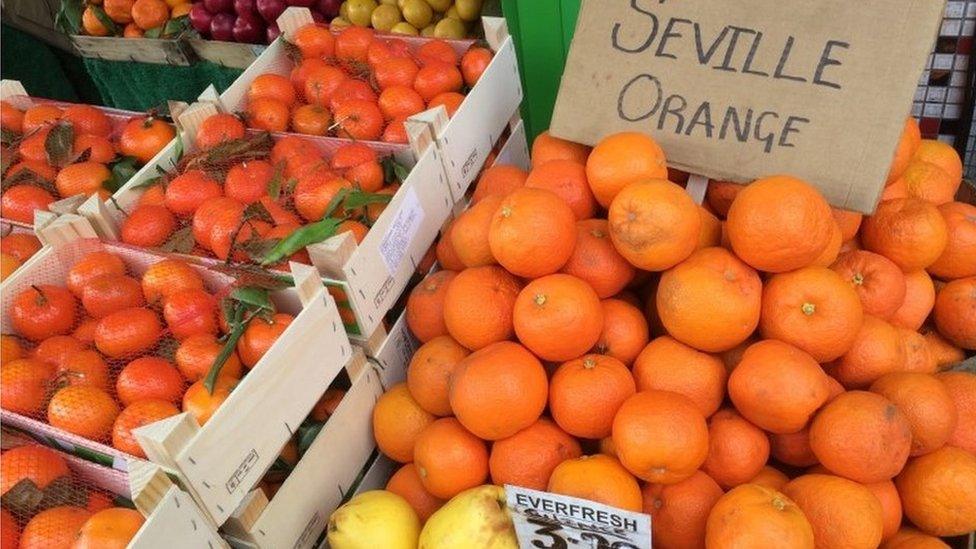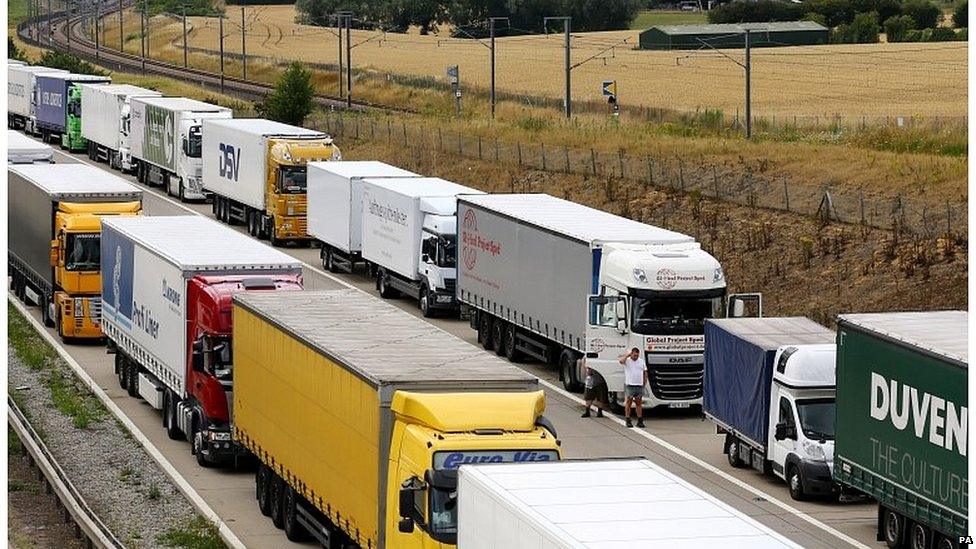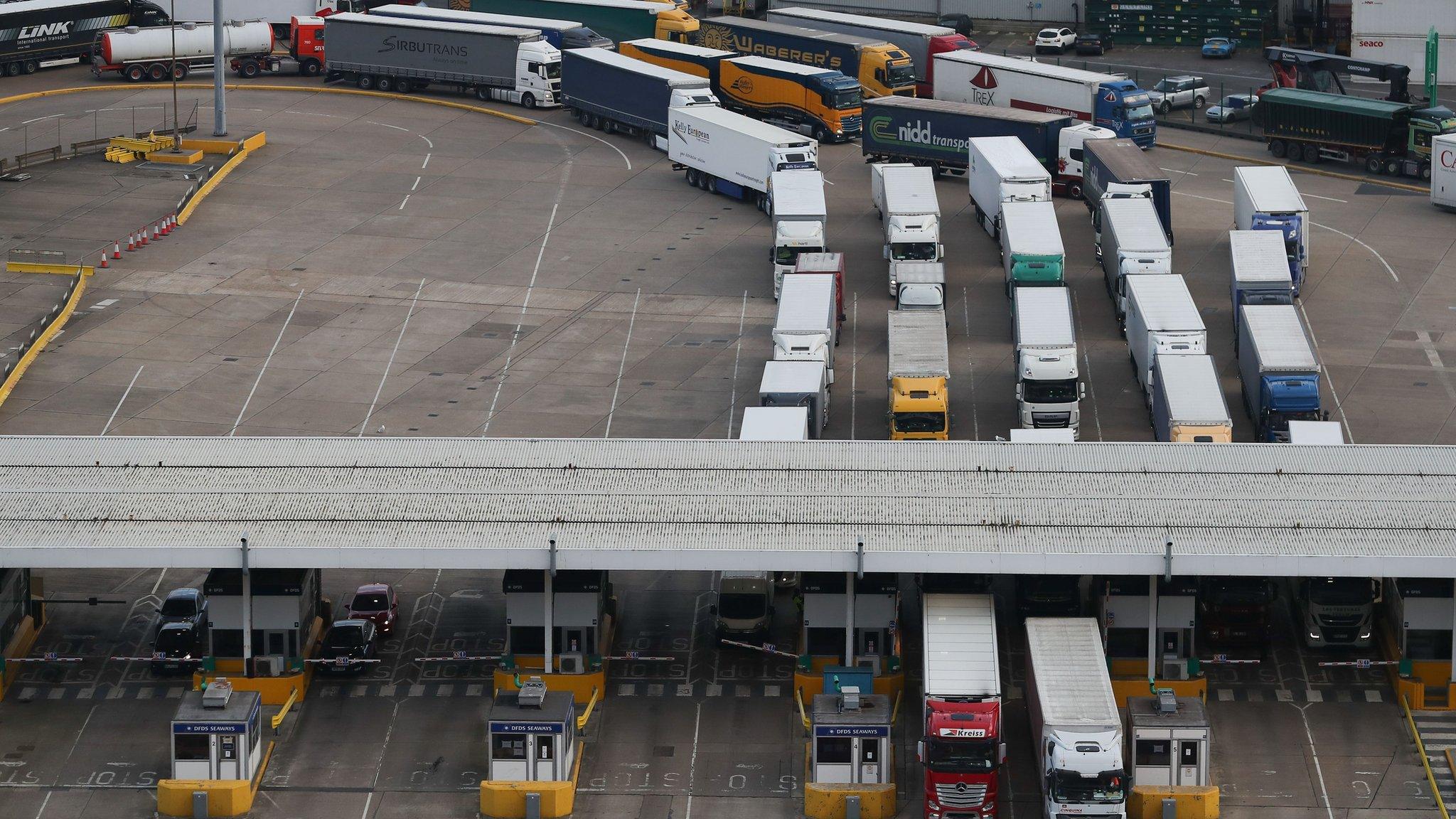Brexit: Warning of rising food bills and disruption to supplies
- Published
- comments

The UK imports roughly half its food - nearly a third of which originates from the EU
Food bills could rise sharply if there is no free trade deal with the European Union after Brexit, peers have warned.
The Lords EU Environment Committee said it was "inconceivable" there would be no impact on EU produce, which makes up 30% of the UK's food imports.
While better-off customers could afford to buy more expensive home-grown goods, it said, those on lower incomes could be left with lower-quality imports.
Officials said the UK's aim was to ensure the "smooth flow" of goods.
Brexit-supporting MPs say leaving the EU could reduce food prices by removing unnecessary regulation on UK farmers and cutting tariffs on imports from the rest of the world.
But the cross-party committee said it was unclear whether the government's primary goal after Brexit was reducing food prices, or maintaining high animal welfare and food safety standards.
In the event of the UK leaving the EU in March 2019 without any deal, it said, the UK could face an average 22% tariff on food imports from the Continent.
"While this would not equate to a 22% increase in food prices for consumers, there can be no doubt that prices paid at the checkout would rise," it said.
"To counteract this, the government could cut tariffs on all food imports, EU and non-EU, but this would pose a serious risk of undermining UK food producers who could not compete on price."
The cabinet's Brexit sub-committee is expected to discuss issues relating to agriculture and food production on Thursday. Half the UK's food is imported, with 30% from the EU, 11% from countries with EU trade deals and the rest from other countries.
Customs delays
The committee said there was a "striking" contrast between the government's apparent confidence over the risk of disruption to food supplies and the "vocal" concerns of industry and consumer bodies.
The UK has said it wants a comprehensive trade deal with the EU and a customs arrangement that continues to ensure "frictionless" trade.

Few freight companies are aware of what will happen after Brexit, the industry suggests
But the government has not yet said what post-Brexit customs arrangement it wants with the EU, with divisions in the cabinet over whether to seek a close "customs partnership" that would not need new border checks or a looser model that would lead to some new checks.
The committee warned the UK's ports would be clogged up if EU goods were subject to the same border checks as other imported produce.
Yet, it said, allowing produce through with few checks would raise safety concerns.
Lord Teverson, the Lib Dem peer who chairs the committee, said food producers and customs officials must be given time to prepare for any changes and consumers reassured that supplies would continue as normal.
After Brexit, British farmers will continue to receive the same level of subsidies they currently get through the EU's Common Agricultural Policy. This will continue until 2022.
But the committee said it would not be possible to increase food production in time to meet any shortfall caused by Brexit.
'Paralysis'
It said any reductions in EU workers could lead to an increase in recruitment or higher wages for domestic workers but the costs may have to be passed on to customers or some businesses "may cease to be viable".
The Freight Transport Association said the "paralysis" at Dover and on the surrounding road network caused by the French ferry workers' strike in 2015 could be repeated if no customs solutions were found.
"The government understands this... so it must be why they are taking so long to make up their minds," said Pauline Bastidon, the organisation's head of European Policy.
Most companies had no idea what the impact of Brexit would be on their business, she said.
"It's surprising to see how little advanced companies are in terms of mapping their flows and looking at what their exposure is," said Ms Bastidon.
"Only a few are starting to fully realise the impact that Brexit will have on their business."
A government spokeswoman said the cost of food depended on range of factors, including commodity prices, exchange rates and oil prices, and this would still apply after Brexit.
She added: "But we also want to ensure consumers have access to a wide range of food, which is why we are considering how we best manage border checks and controls when we leave the EU without impacting the smooth flow of trade."
- Published2 May 2018
